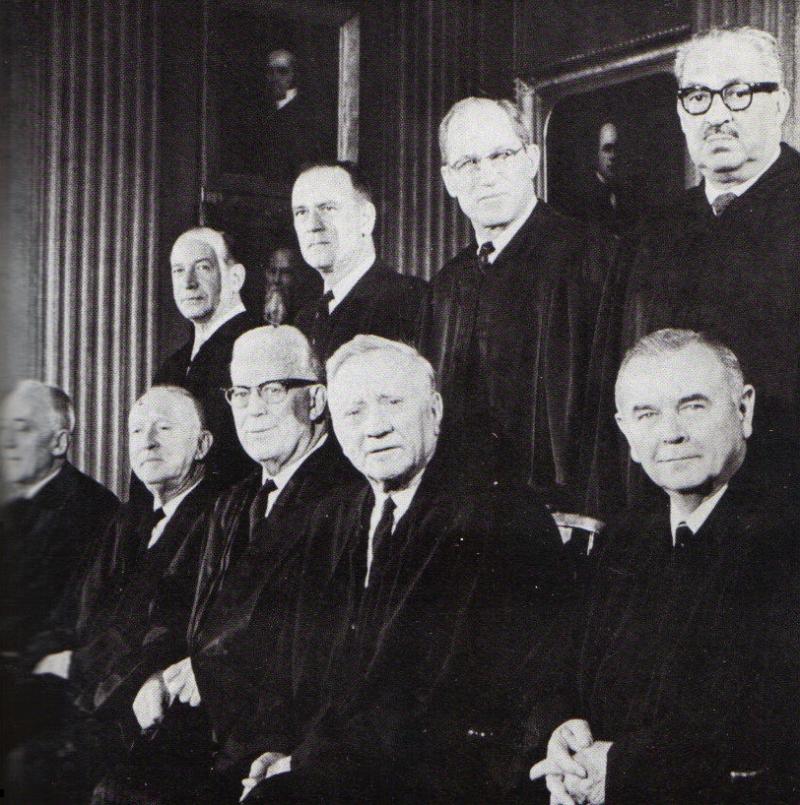The 'forgotten' Supreme Court decision and its impact on our politics




Amid the current national debate over immigration policies, racial discrimination, LGBTQ rights, and executive power, the anniversary of an important legal and political dispute that has directly shaped that debate will pass quietly, its legacy all but forgotten.
In September 1958, sixty years ago next week, the United States Supreme Court finally earned its hard-fought reputation as a co-equal branch of the federal government, in a courtroom drama filled with urgency and uncertainty.
For perhaps the first time, the high court put muscle behind its mandate, asserting in unequivocal terms that its interpretation of the Constitution was the "supreme law of the land," and ordering immediate state compliance.
Thurgood Marshall, the prominent lawyer for the NAACP Legal Defense Fund, had sized up his audience: nine older white men who were none too thrilled about revisiting their landmark precedent that was proving nearly impossible to fully enforce.
The crafty civil rights veteran turned the tables on the justices in a civil rights case debated and decided within hours, which spoke as much about public confidence in government as it did about a hot-button social issue.
Marshall was essentially arguing that officials in Little Rock, Ark. had to follow a federal court order to desegregate its schools. The 50-year-old's focus was not black students seeking equality, but about society's larger civic responsibilities.
"Education is not the teaching of three R's. Education is teaching of the overall citizenship, to learn, to live together with fellow citizens and above all, to learn to obey the law," he says in rarely heard audio of the two-day argument.

Thurgood Marshall was nominated and confirmed to the Supreme Court in 1967. (AP1967)
"I'm not worried about the Negro children at this stage. I don't believe they're in this case as such," Marsall went on. "I worry about the white children in Little Rock who are told as young people that the way to get your rights is to violate the law and defy the lawful authorities. I'm worried about their future. I don't worry about the Negro kids' future. They've been struggling with democracy long enough. They know about it."
The audio was secretly recorded by the court, and only made available to the public decades later. (Marshall's words can be heard here , at the 27:50 mark of Part 2.)
Just a day after the argument, the high court unanimously ordered Arkansas' governor to continue admitting African-American students.
"No state legislator or executive or judicial officer can war against the Constitution without violating his undertaking to support it," wrote a unanimous bench in Cooper v. Aaron. Compliance with the principles of civil rights, as articulated by the federal courts, is "indispensable for the protection of the freedoms guaranteed by our fundamental charter for all of us. Our constitutional ideal of equal justice under law is thus made a living truth."
The Court's ruling in Cooper v. Aaron came four years after the landmark Brown v. Board of Education decision, which found "separate but equal" public facilities unconstitutional. It was groundbreaking, but many civil rights activists believed little progress was made in its initial aftermath, a sentiment echoed today.
"What happened in 1954?" asked current Justice Stephen Breyer in a speech this past January. "Nothing happened. What happened in 1955? Nothing. What happened in 1956? Double nothing."
The Brown ruling simply declared school segregation policies violated the 14th Amendment, implicitly leaving it to the states and lower courts to sort out the consequences. A follow-up decision a year later mandated school integration "with all deliberate speed," with federal court oversight to ensure compliance, but no timetable.
Some states needed no federal encouragement, but others, particularly in the South, were deliberately slow to change, and many courts were reluctant at first to force compliance.
Little Rock's school board initially created a court-backed integration plan, but the state legislature and Gov. Orval Faubus passed new laws banning such efforts. Local sovereignty was at stake, they insisted.
The situation in Arkansas' capital gained national attention in September 1957, when the state's national guard prevented a group of black students from attending the largest high school in the city (the "Little Rock Nine").

Elizabeth Eckford, one of the 'Little Rock Nine' is pursued by white students. (Getty Images)
The crisis escalated after federal courts again ordered Little Rock Central High School's doors to be open to all, and President Dwight Eisenhower sent in Army troops. Despite threats of violence, the black students entered and began taking classes. They were subjected to continuing taunts, threats, and physical violence.
Months later, the school board asked for a delay in implementing the ongoing integration plan, citing "chaos, bedlam, and turmoil." A federal district judge agreed to do so, but a federal appeals court reversed that decision.
It was then that the U.S. Supreme Court intervened in a pair of special argument sessions, ordering immediate integration, and reaffirming existing precedent that the rights of minority students could not be sacrificed in lieu of state concerns about "order and peace." But the united justices went further, asserting clear authority to bind states to their decisions, which could not be circumvented with competing legislation.
Faubus was furious, closing the capital city's public schools, and ordering a special election within days to boost his actions.
"The Supreme Court shut its eyes to all the facts, and in essence said— integration at any price," he declared, "even if it means the destruction of our school system, our educational processes, and the risk of disorder and violence that could result in the loss of life—perhaps yours."
The open defiance continued, token desegregation continued slowly in many parts of the South and Southwest, and the impact is still being felt in many communities.
The citizens of Little Rock called 1958 the "lost year" in Little Rock, but the Supreme Court's newfound recognition of its own inherent power in its decisions would carry on. Some scholars have since called that bench the "living voice of the Constitution."
From the 1960s onward, a host of state laws on abortion, criminal procedure, and civil rights were debated and overturned by the Supreme Court in a series of cases known as single words: Gideon, Miranda, Loving, Roe, and Obergefell.
POLITICAL BACKLASH
But the Cooper vs. Aaron decision also created a legal and political backlash, especially among some conservatives.
Edwin Meese, a former Attorney General under President Ronald Reagan, has been among those who have repeatedly criticized the Supreme Court for what they consider a self-affirming power grab.
"Constitutional interpretation is not the business of the court only, but also, and properly, the business of all branches of government," Meese has written.
The former AG has pinpointed the Cooper decision as the start of an era of an "imperial judiciary."
''Obviously the decision was binding on the parties in the case; but the implication that everyone would have to accept its judgments uncritically, that it was a decision from which there could be no appeal, was astonishing.''
Meese also believes that by saying its interpretation of the Constitution was "the supreme law of the land," that view ''was, and is, at war with the Constitution, at war with the basic principles of democratic government, and at war with the very meaning of the rule of law.''
Supporters of a more limited role for the nine unelected justices have cited Abraham Lincoln's remarks in his 1861 inaugural address.
"If the policy of the government, upon vital questions, affecting the whole people, is to be irrevocably fixed by decisions of the Supreme Court," he said, "the people will have ceased to be their own rulers, having, to that extent, practically resigned their government, into the hands of that eminent tribunal."
Lincoln had his own problems with the Supreme Court, ignoring its ruling the President had no authority to suspend habeas corpus, even in wartime. The justices did not bother to hold Lincoln accountable for his public defiance.
And yet, a Supreme Court confident of its mandate is a concept the public seems now to accept to a large extent. The justices themselves lack any formal enforcement tool except their own legitimacy contained in the power of words and ideas.
Breyer cites the 2000 Bush v. Gore decision that essentially handed the presidency to the Republican.
"What was remarkable about it is that even though vast numbers of Americans thought it was wrong," and even though Breyer himself thought it wrongly decided, "people followed it. In other places, there would have been guns and bullets. The fact that no blood was shed after Bush v. Gore, is what makes America great."






The decision was not forgotten by Justice Kavanaugh, who called it one of the "greatest moments in Supreme Court history". "Brown v. Board of education" we were all taught, held that state laws requiring separate but equal schools violated the Constitution.